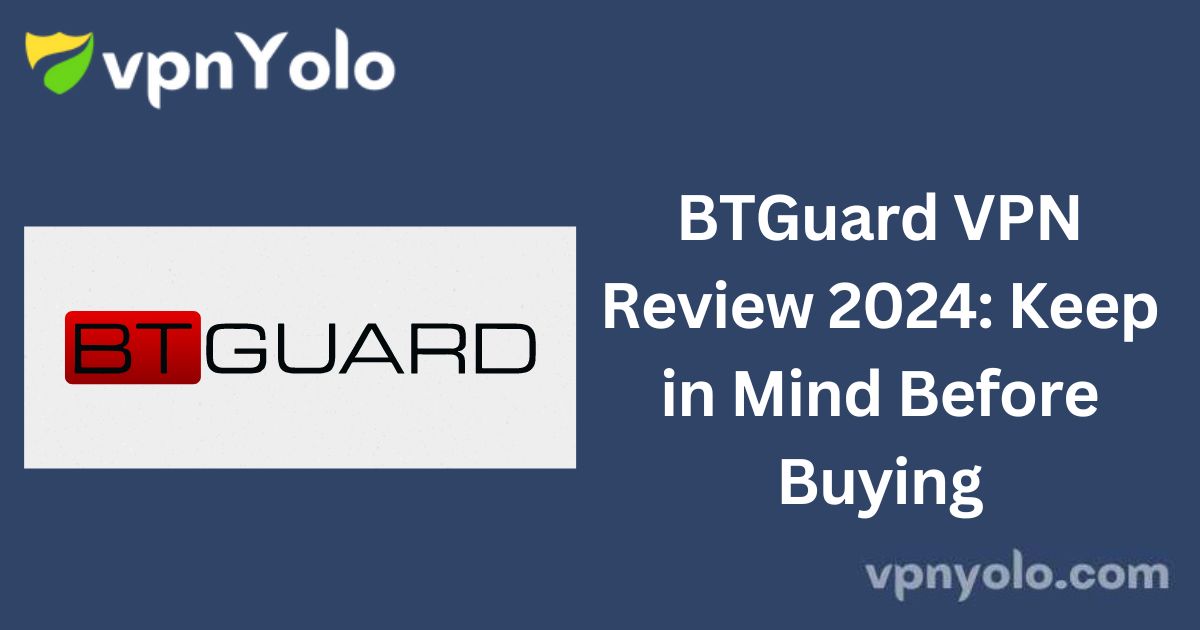Speed Performance — Minimal Loss Despite Distance
When using a VPN, some speed loss is expected due to the geographical distance between your location and the server. However, I experienced minimal speed reduction when compared to my normal connection.
For instance, my download speeds on BTGuard’s long-distance servers ranged from 10.09 Mbps on the Netherlands server to 11.91 Mbps on the Singapore server, with my usual speed being 11.85 Mbps.
The percentage loss ranged from 2.5% to 15%, which falls within the normal range for VPN usage. The average download speed across all servers was 11.18 Mbps, while the average upload speed was 0.7 Mbps.
Are BTGuard VPN’s Speeds Fast Enough for Gaming?
Unfortunately, no. My tests showed that BTGuard’s speeds were not sufficient for a smooth gaming experience. The average ping recorded was 159 ms, which is significantly higher than the ideal range of 50–100 ms for gaming.
Ping measures the time it takes for data to travel to the server and back. A higher ping increases the likelihood of lag, negatively impacting gameplay. While testing with The Sims 3, I frequently experienced high ping, resulting in a suboptimal and frustrating gaming experience.

Server Network — Small, Yet Fast
BTGuard operates a limited yet speedy server network. It features 10 Gbit servers, which offer impressive upload and download speeds. However, the network is notably small, with only 1,000 servers spread across three locations: Singapore, Canada, and the Netherlands.
This limited coverage means users may experience slower performance if there are no nearby servers, and overcrowding on available servers can also reduce speed.
Given that many competing VPN providers offer servers in hundreds of locations at lower prices, BTGuard’s server network is quite underwhelming. Additionally, as mentioned in the streaming section, this small network restricts access to international streaming content.
A concerning issue was the inconsistency in server locations—attempts to connect to the Singapore server repeatedly returned an IP address from the Netherlands, casting doubt on the accuracy of the VPN’s server location claims.
Security — Basic Features with Some Failures
BTGuard’s security measures are average at best, and the VPN failed my leak tests, which is a significant concern.
On the positive side, BTGuard VPN uses 256-bit AES encryption, the industry standard for symmetric encryption, which provides solid protection by using the same key to encrypt and decrypt data. Additionally, it employs asymmetric RSA-1028 encryption for added security.
This hybrid cryptography approach enhances both speed and security by combining symmetric and asymmetric encryption methods.
BTGuard supports two protocols: OpenVPN and PPTP. However, PPTP is outdated and offers weaker protection, making it less suitable for users seeking high levels of security. OpenVPN, on the other hand, is recognized for its robust, military-grade security and continuous improvements, ensuring better protection for users.
A major drawback is the absence of a kill switch. Without this feature, if the VPN connection drops unexpectedly, your data could be exposed without you realizing it.
Lastly, I performed a pre-installation scan of the OpenVPN file on VirusTotal, and it passed without any malicious software detected, which provides some reassurance. However, the lack of advanced security features remains a notable weakness.
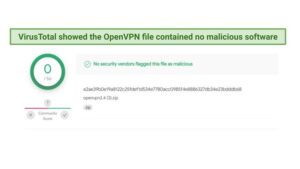
During my tests for IP and DNS leaks, BTGuard VPN did not perform as expected. DNS leaks pose a significant privacy risk, as they allow your Internet Service Provider (ISP) to monitor your online activity, even while using a VPN.
Similarly, an IP leak reveals your real IP address, defeating the purpose of using a VPN to maintain anonymity.
Unfortunately, my tests indicated that both my DNS and IP address were leaking, as they pointed to my actual location instead of the VPN server I had connected to.
I encountered the same issue when using a different browser, which often contributes to leak vulnerabilities. This raises serious concerns about the VPN’s ability to ensure user privacy.
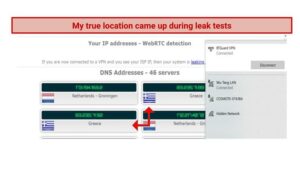
Privacy — Lacking a Privacy-Centric Approach
BTGuard’s privacy policy is brief, and its jurisdiction raises concerns about data protection. Based in Canada, a member of the 5 Eyes Alliance, the VPN is subject to international data-sharing agreements, which compromises user privacy.
Furthermore, Canada has enacted several privacy-invading laws, allowing the government to access and share personal information, making it difficult to fully trust BTGuard’s ability to safeguard your data.
BTGuard claims it does not store, trade, or rent user data, including logs or IP addresses. However, the policy includes a clause that if data collection does occur, it will “identify the purposes for which the information is being collected,” leaving room for potential ambiguity regarding user privacy protections.
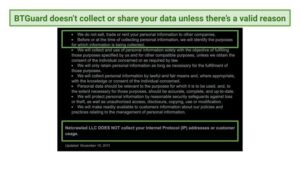
I encountered challenges when testing for IP and DNS leaks, which revealed significant privacy concerns. A DNS leak, in particular, is critical because it allows your Internet Service Provider (ISP) to monitor your online activities despite the use of a VPN. Similarly, an IP leak occurs when your actual IP address remains visible, compromising the anonymity provided by the VPN.
In my testing, I discovered that my VPN was leaking both DNS and IP data, as they were pointing to my home country rather than the VPN server’s location. I repeated the test using a different browser and observed the same results, highlighting that browsers can often be a source of leaks.
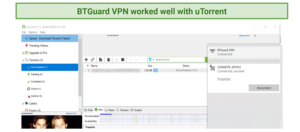
Based on the results of IP and DNS leak tests, I advise against using this VPN. It exposes the actual locations of P2P users within your group, jeopardizing the security of torrenting activities.
This VPN gained popularity following an endorsement from TorrentFreak and is notably transparent about its support for torrenting. However, I do not endorse illegal torrenting practices, and it is crucial to review your country’s regulations to ensure compliance with the law.
For users legally permitted to download torrents in their respective countries, the VPN offers a preconfigured version of uTorrent, simplifying the setup process and saving users time and effort.
Other VPN providers offer P2P-friendly servers at more competitive prices. For recommendations on VPNs that work effectively with torrents, please refer to the following suggestions.
Regarding BTGuard VPN, it does not function in China. The country blocks OpenVPN, and the VPN’s website does not provide any information about service availability in China. I attempted to contact customer service for clarification but did not receive a response.
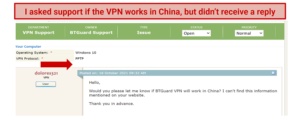
When utilizing a VPN in China to circumvent the Great Firewall, it is essential to select a VPN with robust security features capable of overcoming stringent censorship measures. Additionally, I recommend researching the country’s laws, as they are subject to frequent changes.
Simultaneous Device Connections — Unlimited from One Location at a Time
While you can connect multiple devices, sharing the VPN service among friends and family is prohibited. If BTGuard detects simultaneous connections from different locations, it may result in the suspension of your account.
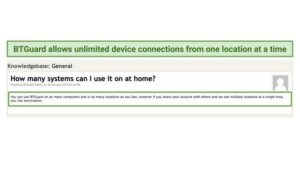
Connecting both my Windows 10 and Mac laptops simultaneously was seamless, which is particularly advantageous for torrenting enthusiasts, as most VPNs typically allow only up to five simultaneous connections.
Installation & Apps: 8.6
Device Compatibility — Support via OpenVPN
The VPN does not offer a native app; however, it can be used on Windows, Mac, Android, and iOS devices by manually downloading the OpenVPN app. Therefore, the compatibility features primarily pertain to OpenVPN.
My research indicates that OpenVPN can present challenges for beginners.
Set-Up & Installation — Challenging Installation Process
The installation process was not straightforward. I encountered issues while trying to install OpenVPN and faced difficulties connecting via PPTP on my Windows 10 computer. The provider recommends experimenting with both PPTP and OpenVPN to determine which option works best for you.
Unfortunately, my attempts to install OpenVPN 2.4.1 on Windows 10 were unsuccessful, as the configuration files would not open after download. Additionally, the older version of OpenVPN failed to launch on both Windows 10 and Mac. While this could be a system-related issue rather than a software malfunction, I did not receive a response from OpenVPN’s support team, prompting me to continue trying PPTP.
Although BTGuard’s instructions for connecting via PPTP were relatively clear, I encountered an error message stating, “A connection to the remote computer could not be established” after installation. I consulted the VPN’s support guides but could not find a solution, leading me to contact customer support, which yielded no response. Ultimately, I discovered a solution on an external website.
Pro Tip: To resolve this issue, navigate to Device Manager, locate Network Adapters, and uninstall all adapters beginning with “WAN Miniport.” After uninstalling, select “Scan for Hardware Changes,” and the adapters will reinstall automatically without the need to restart your system. This process should enable your VPN to function correctly.
Installation Instructions for VPN on Windows and Android
For Android:
Setup Method 1
- Download and install OpenVPN for Android by Arne Schwabe.
- Open a web browser on your Android device and download the configuration files. Unzip these files.
- Launch OpenVPN for Android and tap the icon at the bottom right corner to import the configuration.
- Navigate to the folder where the configuration files are stored. Select the server you wish to connect to and tap Select.
- Tap the Save icon located at the bottom right corner.
- Click on the Settings icon.
- Select Basic.
- Enter your username and password.
- Tap Select… next to the CA certificate, then navigate to the folder containing the configuration files. Select btguard.ca.crt and tap Select.
- Press the back button until you return to the main page.
Setup Method 2
- Download and install OpenVPN Connect.
- Open a web browser on your Android device and download the configuration files (different from those in Method 1). Unzip these files.
- Launch OpenVPN Connect and tap the icon at the top right corner to import.
- Select Import Profile from SD card.
- Navigate to the folder containing the configuration files. Choose the desired server and tap Select.
- Enter your username and password.
For Windows:
- Download the OpenVPN Installation Program.
- Double-click openvpn-install-2.4.0-I602.exe. Follow the prompts to proceed with the installation (click Next, Continue, and confirm).
- Download the OpenVPN BTGuard configuration executable file.
- Launch openvpn_auto_config.exe and click OK.
- Navigate to C:\Program Files\OpenVPN\Config.
Pricing
- 12 Months: $7.50 per month
- 6 Months: $8.33 per month
- 1 Month: $9.95 per month
While BTGuard VPN offers a service, it is comparatively expensive relative to premium VPNs that provide a broader range of features. Even opting for the BitTorrent Proxy service will cost $6.95 per month.
Notably, there is no money-back guarantee, refund option, or free trial available, which poses a challenge as users must commit to an expensive plan without an opportunity to evaluate its value beforehand.
Payment methods include PayPal, credit card, and Bitcoin, with cryptocurrency being a favorable option for those prioritizing privacy.
Reliability & Support:
Rating: 8.5
BTGuard’s customer support is below expectations. While many premium VPNs offer 24/7 support, BTGuard lacks a live chat feature.
To resolve issues, users must submit a ticket. The ticketing system is user-friendly, allowing users to reach out to sales, VPN support, or billing easily. However, the lack of timely responses is unacceptable.
On a positive note, the ‘Knowledgebase’ section on the VPN’s support page is comprehensive. It contains FAQs on subscriptions, technical issues, and is regularly updated with relevant articles.
The Bottom Line: Final Verdict
BTGuard VPN does not provide sufficient value for its price, which is considerably high considering its overall performance does not meet the standards expected of a reliable VPN.
While the VPN offers acceptable speeds, this is not a compelling enough factor to justify its cost. Its security features are basic, privacy practices are questionable, and the setup process can be cumbersome. Although BTGuard targets torrent enthusiasts, it lacks essential features that ensure safe downloading.
Numerous other VPN providers offer superior services at more competitive prices.
Key Features:
- P2P-friendly servers
- Pre-configured version of uTorrent
- Decent connection speeds
- Unlimited device connections
FAQs on BTGuard VPN:
Is BTGuard VPN safe?
BTGuard VPN is relatively safe; however, it does not include any advanced security features and has failed DNS leak tests.
Can BTGuard VPN unblock Netflix?
BTGuard VPN cannot unblock Netflix as it does not operate servers in the United States.
Will BTGuard VPN slow my speeds down?
BTGuard VPN maintains consistent speeds across all its servers, so it is unlikely to slow down your connection.
Money-Back Guarantee: 0 days
Mobile App: Not specified
Number of Devices per License: 1




